Announcing
The Griffin Poetry Prize 2018 Shortlist
TORONTO – April 10, 2018 – Scott Griffin, on behalf of the trustees of The Griffin Trust For Excellence In Poetry, is pleased to announce the International and Canadian shortlist for this year’s prize. Judges Sarah Howe (UK), Ben Lerner (USA), and Ian Williams (Canada) each read 542 books of poetry, from 33 countries, including 17 translations.
The authors of the seven shortlisted books —four International and three Canadian—will be invited to read in Toronto at Koerner Hall at The Royal Conservatory in the TELUS Centre for Performance and Learning, 273 Bloor Street West, Toronto, on Wednesday, June 6 at 7.30 p.m.
The finalists will each be awarded $10,000 for their participation in the Shortlist Readings.
The two winners, to be announced at the Griffin Poetry Prize Awards on Thursday, June 7, will each be awarded $65,000.
Download the 2018 Griffin Poetry Prize shortlist press release, book and publisher details, poet biographies and judges' citations.
International Shortlist

bookHeaven is All Goodbyes
poetTongo Eisen-Martin
publisherCity Lights
Biography
Tongo Eisen-Martin’s previous book, the critically acclaimed someone’s dead already (2015) was nominated for a California Book Award, and his poetry has been featured in Harper’s Magazine. He is also a movement worker and educator who has taught in detention centres from New York’s Rikers Island to California county jails. He has been a faculty member at the Institute for Research in African-American Studies at Columbia University, and his curriculum on the extrajudicial killing of Black People, “We Charge Genocide Again!”, has been used as an educational and organizing tool throughout America. He lives in San Francisco, California.
Judges’ Citation
“Tongo Eisen-Martin’s Heaven Is All Goodbyes moves between trenchant political critique and dreamlike association, demonstrating how, in the right hands, one mode might energize the other—keeping alternative orders of meaning alive in the face of radical injustice. Eisen-Martin’s voice is a chorus of other voices, many arising from prisons and landscapes of engineered poverty; his poems are places where discourses and vernaculars collide and recombine into new configurations capable of expressing outrage and sorrow and love. This unpredictable volume is equally a work of commitment and of wonder; no false consolation, no settling for despair. Its music makes a clearing in the dominant logic of the day. “When a drummer is present, he or she is God // “I am not an I. / I am a black commons.”
More about Tongo Eisen-Martin
The following are links to other Web sites with information about poet Tongo Eisen-Martin.
- Just Keep Running: A Conversation with Tongo Eisen-Martin by Jeffrey Grunthaner (BOMB Magazine)
- A Poet’s Principles (San Francisco Examiner)
- Our Generation: Rules Are Meant to Be Broken, an Interview With Tongo Eisen-Martin (Poetry Foundation)
- ‘Breaking’ Presents: Tongo Eisen-Martin, a Poet With Movement-Building In His Bones (Colorlines)
The Confidence Scheme
The neighborhood looks like someone put their kitchen outside / Like our children love Detroit / And therefore it is better to cry than cry through your hands
(I've been rehearsing my speeches all summer / tracing car keys on paper and calling it poetry)
I'm reaching through the chair Into the back of a rib cage (the metaphor is the chair)
From Heaven is All Goodbyes by Tongo Eisen-Martin
Copyright © 2017 by Tongo Eisen-Martin
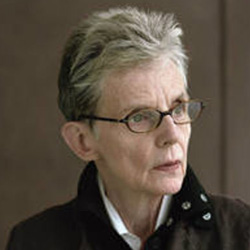
book Debths
poet Susan Howe
publisher New Directions
Biography
Author of more than a dozen books of poetry and two of literary criticism, Susan Howe’s recent collection of poems That This won the Bollingen Prize in 2011. Howe held the Samuel P. Capen Chair in Poetry and the Humanities at the State University New York at Buffalo until her retirement in 2007. The recipient of a Guggenheim Fellowship, she was elected to the American Academy of Arts and Sciences in 1999 and served as a Chancellor to the Academy of American Poets between 2000-2006. In 2009 she was awarded a Fellowship to the American Academy at Berlin. Recently, she was an Artist In Residence at the Isabella Stewart Gardner Museum in Boston. Howe has also released three CDs in collaboration with the musician/composer David Grubbs, Thiefth, Souls of the Labadie Tract, and Frolic Architecture. In 2013 her word collages were exhibited at the Yale Union in Portland, Oregon, and in the Whitney Biennial Spring, 2014. Most recently, a limited press edition of Tom Tit Tot (word collages which amount to a series poem) with artwork by R. H. Quaytman has been published by MoMA in New York, and Spontaneous Particulars: The Telepathy of Archives by Christine Burgin and New Directions.
Judges’ Citation
“In a lecture of 2014, Susan Howe quoted Robert Duncan on how poetry’s secret lies in the “keeping of time”: “Counting the measures … one image may recall another, finding depth in the resounding.” It’s an apt description of Howe’s own method in her extraordinary new book, Debths, which continues to plumb the intertextual depths (also at once debts and deaths) of the archives and collections that have fed her work for almost thirty years. Across the book’s four sections, we hear its poems resound in sympathy not only with their reinvented source materials, but with earlier moments in Howe’s career – one of the most significant, innovative and humane in recent American letters – whose varied threads this new work draws triumphantly together. As Howe writes in her evocative foreword, “Secret connections among artifacts are audible and visible and yet hidden until you take a leap … It’s the mystery of strong music in the soul.” The strong music of Debths reveals itself in poems to be returned to again and again with growing astonishment and gratitude.”
More about Susan Howe
The following are links to other Web sites with information about poet Susan Howe.
- Susan Howe profile (Poetry Foundation)
- Susan Howe, The Art of Poetry No. 97 (The Paris Review)
- Susan Howe’s Patchwork Poems (The New Yorker)
Once when the real world
Once when the real world
was our world in its nature
to mind our would world
Threshold word little hinge
hope of bewilderment its
parchment memory sign
From Debths by Susan Howe
Copyright © 2017 by Susan Howe
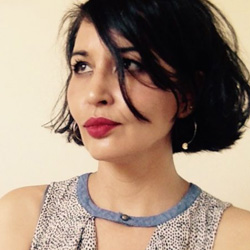
bookWhereas
poetLayli Long Soldier
publisherGraywolf Press
Biography
Layli Long Soldier earned a BFA from the Institute of American Indian Arts and an MFA with honours from Bard College. She is the author of the chapbook Chromosomory (2010) and the full-length collection Whereas (2017), which was a finalist for the National Book Awards. She has been a contributing editor to Drunken Boat and is poetry editor at Kore Press; in 2012, her participatory installation, Whereas We Respond, was featured on the Pine Ridge Reservation. In 2015, Long Soldier was awarded a National Artist Fellowship from the Native Arts and Cultures Foundation and a Lannan Literary Fellowship for Poetry. A citizen of the Oglala Lakota Nation, Long Soldier lives in Tsaile, Arizona, in the Navajo Nation, with her husband and daughter. She is an adjunct faculty member at Diné College.
Judges’ Citation
“Layli Long Soldier’s Whereas repurposes congressional doublespeak in order to lay bare the murderous hypocrisy lurking behind the official language of the state. Deftly deploying a variety of techniques and idioms, Long Soldier has crafted an intricate and urgent counter-history, a work of elegy, outrage and profound generosity that explores what possibilities of interconnection in the present might be enabled by a genuine reckoning with the past. “I am a citizen of the United States and an enrolled member of the Oglala Sioux Tribe,” Long Soldier writes in the introduction to the title poem, “meaning I am a citizen of the Oglala Lakota Nation — and in this dual citizenship, I must work, I must eat, I must art, I must mother, I must friend, I must listen, I must observe, constantly I must live.’”
More about Layli Long Soldier
The following are links to other Web sites with information about poet Layli Long Soldier.
Head Count
In the brain I met someone educated. I spoke to this person who is educated. In the brain I spoke about unbrained things hormones and children nursing and nights without a child in the bed. Sleeping. I spoke about sleeping and in the brain I left our conversation. I went home to undress my things hormones and children and night. In the blue and undressing bed I thought of Jacob or who was it that slept with a rock as a pillow?
From Whereas by Layli Long Soldier
Copyright © 2017 by Layli Long Soldier
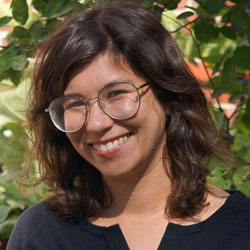
bookHard Child
poetNatalie Shapero
publisherCopper Canyon Press
Biography
Natalie Shapero is the Professor of the Practice of Poetry at Tufts University and an editor at large of the Kenyon Review. Her first poetry collection, No Object, was published by Saturnalia Books in 2013. Natalie’s writing has appeared in publications such as The Nation, The New Republic, The New Yorker, Poetry, and The Progressive. She holds degrees in creative writing and in law and has worked as a litigation fellow with Americans United for Separation of Church and State. Her awards include a National Endowment for the Arts Fellowship, a Ruth Lilly Fellowship, a Kenyon Review Fellowship, and a Great Lakes College Association New Writers Award.
Judges’ Citation
“The poems in Natalie Shapero’s Hard Child come as close as lyric poems can to perfection. We feel the effect of them before noticing their machinery. Yet every poetic instinct Shapero possesses, every decision of line, image, stanza, diction, and tone, results in poems that are limber, athletic, powerful, and balanced. And behind her technical choices lie an emerging ethics: “I don’t want any more of what I have. / I don’t want another spider plant. I don’t //want another lover.” Her poems take us to the purest evolutionary point of the lyric form through their single-speaker stance, the movement of a mind over subjects, the emotional weight carried on the backs of images, the unpredictable associations, the satisfying call-backs. She teaches us how to retain the self without disappearing into the object we behold. She holds herself at various distances from the thing considered. She drives us toward a view and back again. This is how to write a lyric poem.”
More about Natalie Shapero
The following are links to other Web sites with information about poet Natalie Shapero.
- it could not be helped (official web site)
- A Voice of Her Own (Tufts Now)
- An Interview with Natalie Shapero (The Journal – Ohio State University)
Not Horses
What I adore is not horses, with their modern domestic life span of 25 years. What I adore is a bug that only lives one day, especially if it's a terrible day, a day of train derailment or chemical lake or cop admits to cover-up, a day when no one thinks of anything else, least of all that bug.
From Hard Child by Natalie Shapero
Copyright © 2017 by Natalie Shapero
Canadian Shortlist
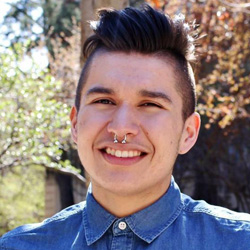
bookThis Wound is a World
poetBilly-Ray Belcourt
publisherFrontenac House
Biography
Billy-Ray Belcourt is from the Driftpile Cree Nation. He is a Ph.D. student at the University of Alberta, and a 2016 Rhodes Scholar who holds a M.St. in Women’s Studies from the University of Oxford. In 2016, he was named one of six Indigenous writers to watch by CBC Books, and was the winner of the 2016 P.K. Page Founder’s Award for Poetry. His work has been published in Assaraus: A Journal of Gay Poetry, Decolonization, Red Rising Magazine, mâmawai-âcimowak, SAD Mag, Yellow Medicine Review, The Malahat Review, PRISM International, and The Next Quarterly.
Judges’ Citation
“Blending the resources of love song and elegy, prayer and manifesto, Billy-Ray Belcourt’s This Wound is a World shows us poetry at its most intimate and politically necessary. Mindful of tangled lineages and the lingering erasures of settler colonialism, Belcourt crafts poems in which “history lays itself bare” – but only as bare as their speaker’s shapeshifting heart. Belcourt pursues original forms with which to chart the constellations of queerness and indigeneity, rebellion and survival, desire and embodiedness these poems so fearlessly explore. Between its bold treatment of sexuality and wary anatomy of despair, This Wound is a World peels back the layers of feeling and experience to offer, finally, the glimmerings of hope – which only sometimes looks like escape: “follow me out the backdoor of the world”. This electrifying book reminds us that a poem may live twin lives as incantation and inscription, singing from the untamed margins: “grieve is the name i give to myself / i carve it into the bed frame. / i am make-believe. / this is an archive. / it hurts to be a story.”
More about Billy-Ray Belcourt
The following are links to other Web sites with information about poet Billy-Ray Belcourt.
- Billy-Ray Belcourt (official web site)
- Everything is Something Else: In Conversation with Billy-Ray Belcourt (PRISM international)
- ‘Overcome with emotion’: First Nations student named Rhodes scholar (CTV News)
- Billy-Ray Belcourt on the meditative power of prose (CBC Books – The Next Chapter)
Everyone is Lonely
everyone is lonely but no one knows what to do about it. once a week i curate obituaries on my facebook wall without even trying. the wind makes away with parts of my body but i don't notice the difference.
From This Wound is a World by Billy-Ray Belcourt
Copyright © 2017 by Billy-Ray Belcourt

bookI have to live.
poetAisha Sasha John
publisherMcClelland and Stewart
Biography
Aisha Sasha John is a poet, dancer and choreographer. Her solo performance ‘The Aisha of Oz’ premiered at the Whitney Museum in New York in 2017. Another iteration of the show will take place at the MAI in Montreal in 2018. Her previous poetry collection, Thou (2014), was a finalist for both the Trillium Book Award for Poetry and the ReLit Poetry Award. In addition to her solo work, she has choreographed, performed, and curated as a member of the performance collective WIVES. Aisha’s video work and text art have been exhibited in galleries and public installations. Born in Montreal, Aisha has an MFA in Creative Writing from the University of Guelph, and a B.A. in African Studies and Semiotics from the University of Toronto.
Judges’ Citation
“Aisha Sasha John’s I have to live shows what poetry can become when stripped of prettiness and polite convention — when in survival mode. Spontaneous, its subjects unposed, its language unrehearsed, each poem has the effect of being taken with a polaroid camera. John writes poems that are resistant to overwrought aesthetics, poems that have popular appeal yet are uninhibited by audience, poems whose casual demeanour belie their fight against casualty. They wind their way into us like a chorus. They gain force by accumulation: “I do. / I did it. / I did. / I had to. / I have to. / I have to live.” As a result, one does not engage with I have to live by familiar means of dissection and analysis. One need only listen, as to an aching friend. No need to fix anything. Just listen.”
More about Aisha Sasha John
The following are links to other Web sites with information about poet Aisha Sasha John.
- Aisha Sasha John (official web site)
- Multidisciplinary artist Aisha Sasha John is U of T Scarborough’s new writer-in-residence (University of Toronto News)
- Aisha Sasha John on the Epiphanic I have to live (Poetry Foundation)
I have to live lest I die-live.
R. says he wants to be here til 250, but He's young. M. says by then he plans on Being Somewhere else. I have to Live here while I Can.
From I have to live by Aisha Sasha John
Copyright © 2017 by Aisha Sasha John
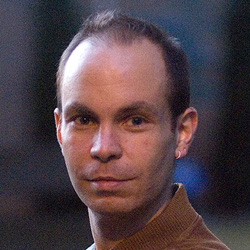
bookSame Diff
poetDonato Mancini
publisherTalonbooks
Biography
The interdisciplinary practice of Donato Mancini focuses mainly on poetry, bookworks, text-based visual art and cultural criticism. His books and chapbooks include Snowline (2015), Loitersack (2014), Buffet World (2011), Fact ‘N’ Value (2011), Hell Passport no.22 (2008), Æthel (2007), 58 Free Coffees (2006), and Ligatures (2005). Ligatures and Æthel were each nominated for the ReLit Poetry Award, and Ligatures received honourable mention in the Alcuin Society book design awards. Mancini’s published critical writing includes work on the archive, time, and memory in Anamnesia: Unforgetting (2011), and a discourse analysis of poetry reviews in You Must Work Harder to Write Poetry of Excellence (2012). He holds a Ph.D. in English from the University of British Columbia.
Judges’ Citation
“Donato Mancini’s Same Diff crosses pre-existing texts with a strong design impulse to assemble a work of unusual beauty, resonance, and timelessness. In “Snowline,” a famous French phrase about snow is translated over centuries; translations snow down the pages until the original phrase is buried; they fall through different hands until they turn from snow into a meditation on time. Mancini’s primary methods are curatorial (he assembles), orchestral (he co-ordinates), mechanical (he repeats), and archaeological (he excavates language rather than the world for his materials). He fractures words to let out their yolk. Same Diff is a monument to Mancini’s accomplishments: he uses the words of others without appropriation; he negotiates self-effacement, humility, and invisibility; he offers a way to recover a self, not through self-assertion, but by attending to the voices and needs of others. What belongs to any of us? Even Mancini’s words never seem to be his. He is a custodian of language who returns it to us cleaned.”
More about Donato Mancini
The following are links to other Web sites with information about poet Donato Mancini.
- An Interview with Donato Mancini (CWILA – Canadian Women in the Literary Arts)
- Put on Your Negative Capability Helmet and Go with It: Excerpts from a Conversation with Donato Mancini (The Puritan)
- Buffet World – Donato Mancini (Full Stop)
Bottom of the Pot
Each woman received a ladleful.
Hand-made utensils (author's drawing): (a) bowl made from a turtle's shell, (b) spoon made from half a coconut, (c) cup made from a gourd, (d) lamp using coconut oil, (e) cooking stove made from scrap aluminum.
By this time we had all acquired soup containers - a round tin with two holes punched near the top through which a string or narrow piece of material or wire was threaded.
From Same Diff by Donato Mancini
Copyright © 2017 by Donato Mancini
Tickets for the Shortlist Readings to be held on Wednesday, June 6, at Koerner Hall at The Royal Conservatory in the TELUS Centre for Performance and Learning, 273 Bloor Street West, Toronto are available at https://www.rcmusic.com/events-and-performances/griffin-poetry-prize-readings, or by calling (416) 408-0208.
Each year, The Griffin Trust For Excellence In Poetry presents an anthology of poems selected from the shortlisted books, published by House of Anansi Press. The 2018 Anthology can be purchased at https://houseofanansi.com/products/the-2018-griffin-poetry-prize-anthology.
Note to booksellers: Griffin Poetry Prize book stickers are supplied free of charge by The Griffin Trust. Contact info@griffinpoetryprize.com to place an order. Winner book stickers will be available after June 7.
Media Inquiries:
Melissa Shirley
Tel: (647) 389-9510
Email: publicity@griffinpoetryprize.com
General Inquiries:
Ruth Smith, Executive Director
Tel: (905) 618-0420
Email: info@griffinpoetryprize.com
Links
| Shortlisted Publishers’ Web sites: | |
|---|---|
| City Lights: | citylights.com/publishing |
| Copper Canyon Press: | coppercanyonpress.org |
| Frontenac House: | frontenachouse.com |
| Graywolf Press: | graywolfpress.org |
| McClelland & Stewart: | penguinrandomhouse.ca/imprints/mcclelland-stewart |
| New Directions: | ndbooks.com |
| Talonbooks: | www.talonbooks.com |
Downloadable photographs of the 2018 shortlisted poets:
https://staging.griffinpoetryprize.com/news-and-events/media-resources/
Download the 2018 Griffin Poetry Prize shortlist press release, book and publisher details, poet biographies and judges’ citations.
Download
Get your tickets for the 2018 Griffin Poetry Prize readings at Koerner Hall. Call (416) 408-0208 or
click here to purchase them online.